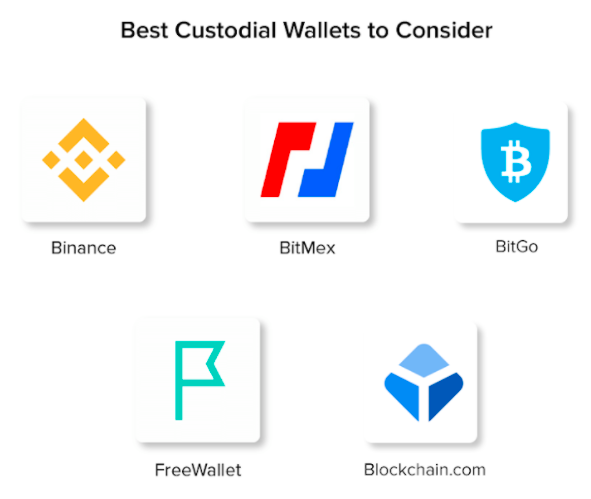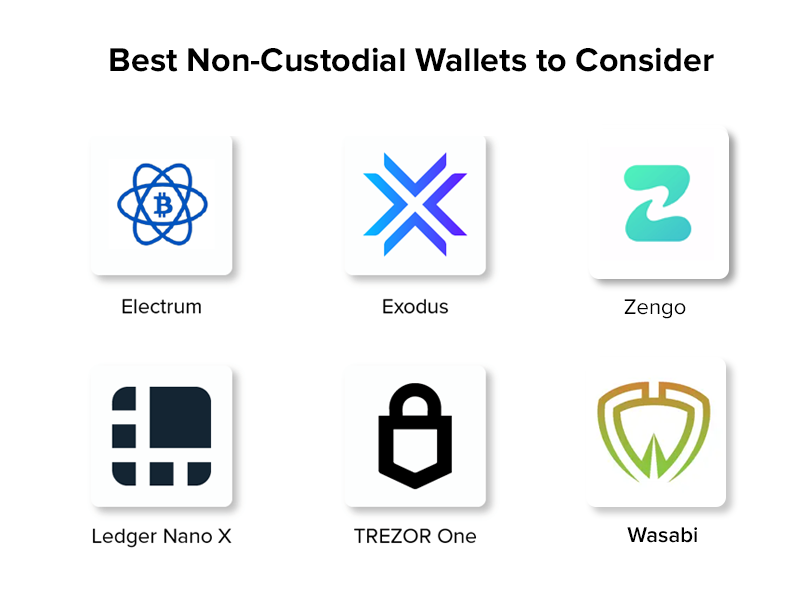Custodial vs. Non-Custodial Wallets: Understanding the Difference Points
Purchasing cryptocurrency is in rage!
And once you’ve purchased cryptocurrency, you should decide and make sure what to choose, a custodial or non-custodial wallet to store your funds?
To start with, we know how blockchain app developers and business founders take keen interest in determining how to incorporate the two into their processes and relish better opportunities compared to those offered by the traditional models.
The business model which has emerged as an ideal one are Cryptocurrency Wallets. But the entrepreneurs’ confusion doesn’t end at identifying the “right” business model which blends both Blockchain and Cryptocurrencies perfectly.
While many are debating on blockchain beyond cryptocurrencies, how to create a Blockchain wallet, and which cryptocurrency will become the single global currency, many others are focusing on choosing the right wallet as per custody of private key: Custodial vs Non-Custodial crypto wallet comparison. Something about which we will discuss in detail in this article.
But before we jump to the part where we look into the Custodial vs. Non-Custodial comparison, let’s uncover the basics of both the blockchain wallet types, starting with Custodial Wallets first.
What is a Custodial Wallet?
A Custodial Wallet is defined as a wallet in which the private keys are held by a third party. Meaning, the third party has full control over your funds while you only have to give permission to send or receive payments.
What is a Non-Custodial Wallet?
It is a type of Blockchain wallet that lets you be your own bank. This implies that users have full control over their funds and on the associated private key. If you want to know more about blockchain wallets, you can read here.
What Is The Difference Between Custodial And Non-Custodial Wallet?
1. Custodian of private key
The foremost factor to consider when comparing the Custodial vs non-custodial wallets is who holds the private key.
In case of Custodial wallets, the third party manages the private key. Whereas, in the case of Non-Custodial wallets, all the blockchain custodian services reside with users.
So, in case you want to introduce a wallet where users can be their own bank, go with the idea of creating non-Custodial blockchain wallets.
2. Transaction type
Another factor to consider during Custodial and Non-Custodial crypto wallet comparison is the transaction type.
The transaction is reflected on the chain in real-time in Non-Custodial. But, it is not so in the case of Custodial wallet.
This again shows that the former leads the show.
3. Security
In the case of custodial online crypto wallets, all the sensitive user data is stored in hot and cold storage, which are often hacked by data intruders. Because of this, the security level is low in custodial, unless the authoritative party implements strong security measures.
Whereas, in case of Non-Custodial crypto wallet comparison, the whole information remains with users. This reduces the risk of data being stolen, unless the user shares the details with someone, or their device gets stolen.
So, here again, Non-Custodial wins the Custodial vs Non-Custodial wallets battle.
4. Backup and recovery possibility
When it comes to backup and recovery possibilities, non-Custodial crypto wallets lag behind the Custodial one.
The Custodial wallets keep the private key with themselves. So, even if you lose the access to data, you can regain the access by requesting the third party.
However, this is not possible in the case of Non-Custodial wallets where you are the sole authority.
5. Offline accessibility
To access your funding and corresponding details, it is a must to login into your Custodial wallet and make a request to centralized authority. This makes it imperative to have internet connectivity.
But, there is no such requirement in Non-Custodial wallets. This, in return, signifies that Non-Custodial wallets are a better option to enjoy full blockchain development services in real-time.
6. Future scope
As per the cryptocurrencies market trends, Non-custodial wallets will continue to get an edge over Custodial due to the growing data breach cases and users becoming more conscious about their data privacy and security.
7. Examples
Some of the popular examples of best Custodial wallets are: Free Wallet, Binance, BitMex, Bitgo, Blockchain.com.

Some examples of best Non-custodial wallet 2021 are: Electrum, Exodus, Ledger Nano X, Trezor One, Zengo, Wasabi, among others.

While the aforementioned ‘Custodial vs. Non-Custodial wallets’ comparative factors will help you in picking the right Blockchain wallet, we highly recommend Non-Custodial Wallets. For, these list of non-custodial wallets offer ample opportunities and hold a better future in the marketplace – something which in turn establishes itself as a profitable business decision.
Now let’s dive into the understanding of Custodial vs. Non-Custodial wallets part where the advantages and disadvantages of both the crypto wallets are discussed.
What Are The Benefits And Limitations Of Custodial Wallets?
Benefits of Considering Custodial Wallets
Free transactions
One of the biggest benefits of a Custodial wallet is that it, unlike other wallets, do not demand a transaction fee. It enables customers to make transactions for free within the ecosystem. A perfect example of this is Freewallet – a custodial wallet that helped consumers save around $500,000 on network fees back in 2019.
No major effect of lost private keys
A third party manages your custodial wallet. So, even if you lose your private key or forget the mnemonic phrase, it is easy to regain access to your wallet and your stored funds.
Higher backup possibility
Another advantage of custodial wallets is that the central authority managing your wallet offers backup facilities. This makes it easier to undo any transaction or restore a previous version.
Drawbacks of Custodial Wallets
Custodian’s control over your money
The biggest disadvantage of going with Custodial cryptocurrency services is that you do not have autonomy over your wallet.
The third party, i.e, the custodian, has complete control over your funds and associated processes. They have the freedom to take action on the funds, including freezing the stored amount.
Need for KYC
Another drawback of introducing Custodial wallet to your services is that this wallet type strictly recommends users to perform KYC (Know Your Customer, ID Verification). You cannot gain access to your funds or any of the related services without proving your identity. This necessity of identifying verification impedes the basic principle of Cryptocurrency, i.e, anonymity.
Data breach threat
With custodial vs non-custodial exchange, the first time you purchase crypto, it is likely that it will end in a custodial exchange online crypto wallet.
In the case of Custodial cryptocurrency exchanges, a huge amount of users’ funds is stored in cold and hot wallets. While these wallets may not be an easy target for hackers due to the involvement of various conformations, they are still vulnerable to security breaches.
One such incident is that of Japanese exchange Mt. Gox in 2014, where over 70% of the bitcoin transactions were hacked, which resulted in a loss of around $450M.
No offline facility
Last but not least, the Internet connection is a must for logging in the Custodial wallets or to perform any transaction.
With this covered, let’s dive into the concept of Non-Custodial wallets to get a crystal clear idea of both before we jump to the part where we look into the Custodial vs. Non-Custodial comparison.
What Are The Benefits And Limitations Of Non-custodial Wallets?
Benefits of Non-custodial Wallets
Users’ control over funds
The prime reason why Non-Custodials are gaining a huge momentum is because they provide users an individual access to their funds. The users need not look up to any third party to manage their fundings or perform any related activity.
Safety in funding
Since all the details associated with your online Crypto wallet and its funds relies on you, the risk of data breach is much lower. This is one of the primary reasons why 66.5% of crypto holders are relying on non-custodial and mobile storage solutions these days.
Instant withdrawals
Unlike best Custodial wallets, these wallets do not need confirmation from a third party for performing every transaction. This streamlines the whole process and makes it easier to enjoy instant withdrawals.
With this covered, let’s look into the limitations of non-custodial crypto wallets to make a neutral decision.
When it comes to the drawbacks of Non-Custodial wallets, there is nothing major that can be highlighted. The wallet type offers the best Blockchain facilities. However, to relish its benefits, it is necessary for users to store their key securely.
Drawbacks of Non-custodial Wallets
Trade delay
It will be hard to trade the currency quickly, as in noncustodial it will initially be sent to an exchange.
More responsibility
Being accountable for your own security means a lot of responsibility. Even the tiniest of mistakes could lead to robbery, deletion, or unplanned consequences.
User interface
User Interfaces are presented in a way that is a bit more difficult to understand.
Keys lost equals money lost
On the off chance that you lose your key and seed phrase, there won’t be anyone to assist you restoring your wallet or data. Losing a private key or mnemonic seed can make the user lose access to their wallet, with no backup and recovery possibility.
Frequently Asked Questions
Q. What is the Difference Between Custodial and Non-custodial Cryptocurrency Services?
The prime difference between custodial and non-custodial cryptocurrency services is that the private key is managed by third parties in the former case, whereas it is handled by users in the latter case.
Q. How to create the best non-custodial wallet 2021?
Creating a non-Custodial crypto wallet is an extensive and complicated process. So, it is advisable to consult with a reputed Blockchain development company for developing it.
Q. How Custodial wallet works?
Here’s how the custodial wallets work: A (third party in this case) asks B (users in this case) to transfer their funds to a particular address/place, but A does not receive any private key to that storage address. The third party authority manages all the funding, with the condition that users won’t be able to perform any transaction without their involvement.
Q. What does noncustodial mean?
Generally non-custodial means not having custody. In this article non-custodial in the context of blockchain wallet means a type of wallet that permits users to own their private key, which are in encrypted storage. Users have full control of their funds.
Q. What are private keys?
Private keys are a series of private alpha-numeric code that is combined with a public key.
If you are looking for a good consultation on blockchain wallets then you can consult great experts of blockchain app development company.
Ending Thoughts
Custodial wallet providers are popular as they have good UI, but their numbers are still low because users demand more control over their crypto wallets.
The best non-custodial wallet 2021 is adopted by more people because the users have full control over the funds, but with having full control also comes a great responsibility.
The basic difference between a custodial wallet and a non-custodial wallet is that in custodial the private key is held by a third party and in non-custodial, users are themselves responsible and in full control of their assets.
Taking the thought forward, if you are planning to introduce the best non-custodial wallet 2021 into your business offering, it can be a good start to consult the best Blockchain development company in USA.

strategies your digital product..




